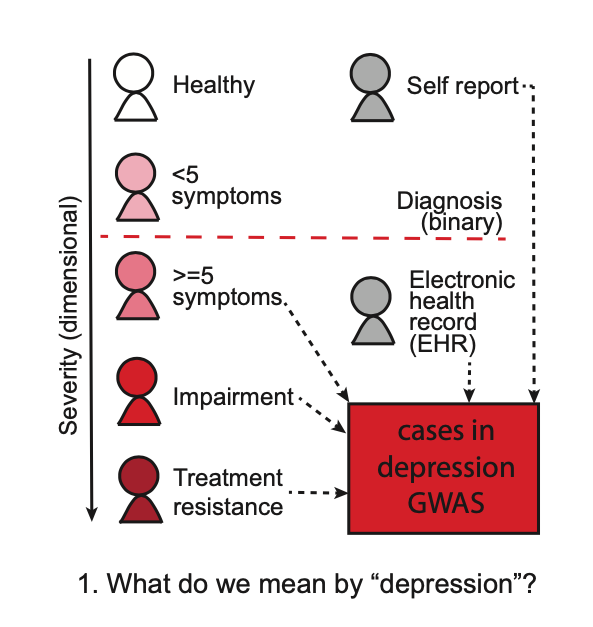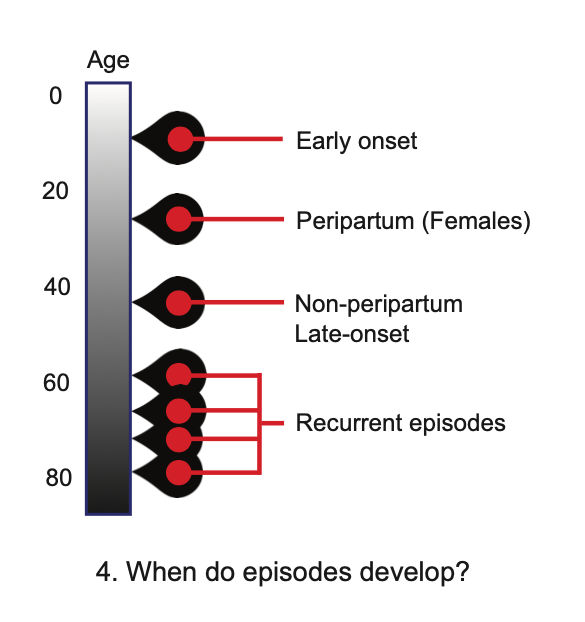New review with @EikoFried and @karmelchoi in @hmg_journal on #heterogeneity in #depression - we identified three sources of #heterogeneity in #depression in #genetic studies (mostly from past 10 yrs): operationalization, manifestations and etiology. https://tinyurl.com/y5mkfmp3 ">https://tinyurl.com/y5mkfmp3&... (1/8)
Operationalisation pertains to how we do #science. #depression has been defined/measured differently in diff. studies, relying on diff. criteria and identifying non-overlapping sets of cases. Referring to all of them as ‘major depression’ obfuscates important differences. (2/8)
Manifestations encompass differences in symptoms, severity, developmental timing, comorbidities and physiology - cases may differ dramatically in these respects. We identify subtypes using manifestations through clinical experience or, increasingly, #data-driven means. (3/8)
Etiology has to do with the combination of #genetic, #environmental and other factors leading to one’s disease, as well as their interactions. In particular, trying to disentangle effects of diverse environments from heterogeneous genetic effects is very challenging. (4/8)
As depression may reflect several highly heterogeneous phenotypes, and it is difficult to agree upon a single construct that can be consistently measured, #splitting (study symptoms) or #lumping (study transdiagnostic factors) may be two productive ways forward. (5/8)
Overall, we found that heterogeneity in operationalizations of #depression affect studies on heterogeneity in #depression manifestations and etiology, and is a considerable source of inconsistency. Even the best methods can& #39;t overcome missing and inconsistent data. (6/8)
Which is why our first two recommendations are 1) measuring more and 2) measuring consistently. Also, we can& #39;t stay in a mono-disciplinary vacuum - we need to 3) #collaborate with clinicians and other experts, and 4) follow up on our results with functional studies. (7/8)
It was a great experience working with @EikoFried and @karmelchoi - I also miss our friday evening discussions (which are always interesting and thought provoking), and I definitely hope there other projects to work on together soon!!!  https://abs.twimg.com/emoji/v2/... draggable="false" alt="🤝" title="Handschlag" aria-label="Emoji: Handschlag">
https://abs.twimg.com/emoji/v2/... draggable="false" alt="🤝" title="Handschlag" aria-label="Emoji: Handschlag"> https://abs.twimg.com/emoji/v2/... draggable="false" alt="🤗" title="Umarmendes Gesicht" aria-label="Emoji: Umarmendes Gesicht">
https://abs.twimg.com/emoji/v2/... draggable="false" alt="🤗" title="Umarmendes Gesicht" aria-label="Emoji: Umarmendes Gesicht"> https://abs.twimg.com/emoji/v2/... draggable="false" alt="😊" title="Lächelndes Gesicht mit lächelnden Augen" aria-label="Emoji: Lächelndes Gesicht mit lächelnden Augen">(8/8)
https://abs.twimg.com/emoji/v2/... draggable="false" alt="😊" title="Lächelndes Gesicht mit lächelnden Augen" aria-label="Emoji: Lächelndes Gesicht mit lächelnden Augen">(8/8)

 Read on Twitter
Read on Twitter




